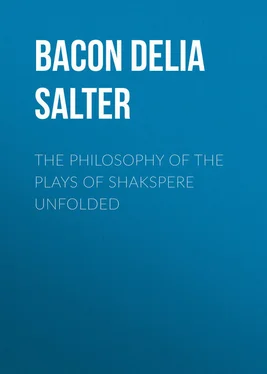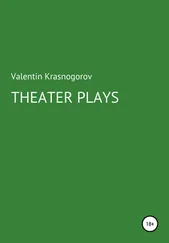Delia Bacon - The Philosophy of the Plays of Shakspere Unfolded
Здесь есть возможность читать онлайн «Delia Bacon - The Philosophy of the Plays of Shakspere Unfolded» — ознакомительный отрывок электронной книги совершенно бесплатно, а после прочтения отрывка купить полную версию. В некоторых случаях можно слушать аудио, скачать через торрент в формате fb2 и присутствует краткое содержание. Жанр: literature_19, foreign_antique, foreign_prose, на английском языке. Описание произведения, (предисловие) а так же отзывы посетителей доступны на портале библиотеки ЛибКат.
- Название:The Philosophy of the Plays of Shakspere Unfolded
- Автор:
- Жанр:
- Год:неизвестен
- ISBN:нет данных
- Рейтинг книги:3 / 5. Голосов: 1
-
Избранное:Добавить в избранное
- Отзывы:
-
Ваша оценка:
- 60
- 1
- 2
- 3
- 4
- 5
The Philosophy of the Plays of Shakspere Unfolded: краткое содержание, описание и аннотация
Предлагаем к чтению аннотацию, описание, краткое содержание или предисловие (зависит от того, что написал сам автор книги «The Philosophy of the Plays of Shakspere Unfolded»). Если вы не нашли необходимую информацию о книге — напишите в комментариях, мы постараемся отыскать её.
The Philosophy of the Plays of Shakspere Unfolded — читать онлайн ознакомительный отрывок
Ниже представлен текст книги, разбитый по страницам. Система сохранения места последней прочитанной страницы, позволяет с удобством читать онлайн бесплатно книгу «The Philosophy of the Plays of Shakspere Unfolded», без необходимости каждый раз заново искать на чём Вы остановились. Поставьте закладку, и сможете в любой момент перейти на страницу, на которой закончили чтение.
Интервал:
Закладка:
This then is the association of which Raleigh was the chief; this was the state, within the state which he was founding. ('See the reach of this man,' says Lord Coke on his Trial.) It is true that the honour is also ascribed to Montaigne; but we shall find, as we proceed with this inquiry, that all the works and inventions of this new English school, of which Raleigh was chief, all its new and vast designs for man's relief, are also claimed by that same aspiring gentleman, as they were, too, by another of these Egotists, who came out in his own name with this identical project.
It was only within the walls of a school that the great principle of the new philosophy of fact and practice, which had to pretend to be profoundly absorbed in chemical experiments, or in physical observations, and inductions of some kind – though not without an occasional hint of a broader intention, – it was only in esoteric language that the great principles of this philosophy could begin to be set forth in their true comprehension . The very trunk of it, the primal science itself, must needs be mystified and hidden in a shower of metaphysical dust, and piled and heaped about with the old dead branches of scholasticism, lest men should see for themselves how broad and comprehensive must be the ultimate sweep of its determinations; lest men should see for themselves, how a science which begins in fact, and returns to it again, which begins in observation and experiment, and returns in scientific practice, in scientific arts, in scientific re-formation, might have to do, ere all was done, with facts not then inviting scientific investigation – with arts not then inviting scientific reform.
In consequence of a sudden and common advancement of intelligence among the leading men of that age, which left the standard of intelligence represented in more than one of its existing institutions, very considerably in the rear of its advancement, there followed, as the inevitable result, a tendency to the formation of some medium of expression, – whether that tendency was artistically developed or not, in which the new and nobler thoughts of men, in which their dearest beliefs, could find some vent and limited interchange and circulation, without startling the ear . Eventually there came to be a number of men in England at this time, – and who shall say that there were none on the continent of this school, – occupying prominent positions in the state, heading, it might be, or ranged in opposite factions at Court, who could speak and write in such a manner, upon topics of common interest, as to make themselves entirely intelligible to each other, without exposing themselves to any of the risks, which confidential communications under such circumstances involved.
For there existed a certain mode of expression, originating in some of its more special forms with this particular school, yet not altogether conventional, which enabled those who made use of it to steer clear of the Star Chamber and its sister institution; inasmuch as the terms employed in this mode of communication were not in the more obvious interpretation of them actionable, and to a vulgar, unlearned, or stupid conceit, could hardly be made to appear so. There must be a High Court of Wit, and a Bench of Peers in that estate of the realm, or ever these treasons could be brought to trial. For it was a mode of communication which involved in its more obvious construction the necessary submission to power. It was the instructed ear, – the ear of a school, – which was required to lend to it its more recondite meanings; – it was the ear of that new school in philosophy which had made History the basis of its learning, – which, dealing with principles instead of words , had glanced, not without some nice observation in passing, at their more ' conspicuous ' historical 'INSTANCES'; – it was the ear of a school which had everywhere the great historical representations and diagrams at its control, and could substitute, without much hindrance, particulars for generals, or generals for particulars, as the case might be; it was the ear of a school intrusted with discretionary power, but trained and practised in the art of using it.
Originally an art of necessity, with practice, in the skilful hands of those who employed it, it came at length to have a charm of its own. In such hands, it became an instrument of literary power, which had not before been conceived of; a medium too of densest ornament, of thick crowding conceits, and nestling beauties, which no style before had ever had depth enough to harbour. It established a new, and more intimate and living relation between the author and his reader, – between the speaker and his audience. There was ever the charm of that secret understanding lending itself to all the effects. It made the reader, or the hearer, participator in the artist's skill, and joint proprietor in the result. The author's own glow must be on his cheek, the author's own flash in his eye, ere that result was possible. The nice point of the skilful pen, the depth of the lurking tone was lost, unless an eye as skilful, or an ear as fine, tracked or waited on it. It gave to the work of the artist, nature's own style; – it gave to works which had the earnest of life and death in them the sport of the 'enigma.'
It is not too much to say, that the works of Raleigh and Bacon, and others whose connection with it is not necessary to specify just here, are written throughout in the language of this school. 'Our glorious Willy' – (it is the gentleman who wrote the 'Faery Queene' who claims him, and his glories, as 'ours'), – 'our glorious Willy' was born in it, and knew no other speech. It was that 'Round Table' at which Sir Philip Sydney presided then, that his lurking meanings, his unspeakable audacities first 'set in a roar.' It was there, in the keen encounters of those flashing 'wit combats,' that the weapons of great genius grew so fine. It was there, where the young wits and scholars, fresh from their continental tours, full of the gallant young England of their day, – the Mercutios, the Benedicts, the Birons, the Longuevilles, came together fresh from the Court of Navarre, and smelling of the lore of their foreign 'Academe,' or hot from the battles of continental freedom, – it was there , in those réunions , that our Poet caught those gracious airs of his – those delicate, thick-flowering refinements – those fine impalpable points of courtly breeding – those aristocratic notions that haunt him everywhere. It was there that he picked up his various knowledge of men and manners, his acquaintance with foreign life, his bits of travelled wit, that flash through all. It was there that he heard the clash of arms, and the ocean-storm. And it was there that he learned 'his old ward.' It was there, in the social collisions of that gay young time, with its bold over-flowing humours, that would not be shut in, that he first armed himself with those quips and puns, and lurking conceits, that crowd his earlier style so thickly, – those double, and triple, and quadruple meanings, that stud so closely the lines of his dialogue in the plays which are clearly dated from that era, – the natural artifices of a time like that, when all those new volumes of utterance which the lips were ready to issue, were forbidden on pain of death to be 'extended,' must needs 'be crushed together, infolded within themselves.'
Of course it would be absurd, or it would involve the most profound ignorance of the history of literature in general, to claim that the principle of this invention had its origin here. It had already been in use, in recent and systematic use, in the intercourse of the scholars of the Middle Ages; and its origin is coeval with the origin of letters. The free-masonry of learning is old indeed. It runs its mountain chain of signals through all the ages, and men whom times and kindreds have separated ascend from their week-day toil, and hold their Sabbaths and synods on those heights. They whisper, and listen, and smile, and shake the head at one another; they laugh, and weep, and complain together; they sing their songs of victory in one key. That machinery is so fine, that the scholar can catch across the ages, the smile, or the whisper, which the contemporary tyranny had no instrument firm enough to suppress, or fine enough to detect.
Читать дальшеИнтервал:
Закладка:
Похожие книги на «The Philosophy of the Plays of Shakspere Unfolded»
Представляем Вашему вниманию похожие книги на «The Philosophy of the Plays of Shakspere Unfolded» списком для выбора. Мы отобрали схожую по названию и смыслу литературу в надежде предоставить читателям больше вариантов отыскать новые, интересные, ещё непрочитанные произведения.
Обсуждение, отзывы о книге «The Philosophy of the Plays of Shakspere Unfolded» и просто собственные мнения читателей. Оставьте ваши комментарии, напишите, что Вы думаете о произведении, его смысле или главных героях. Укажите что конкретно понравилось, а что нет, и почему Вы так считаете.












